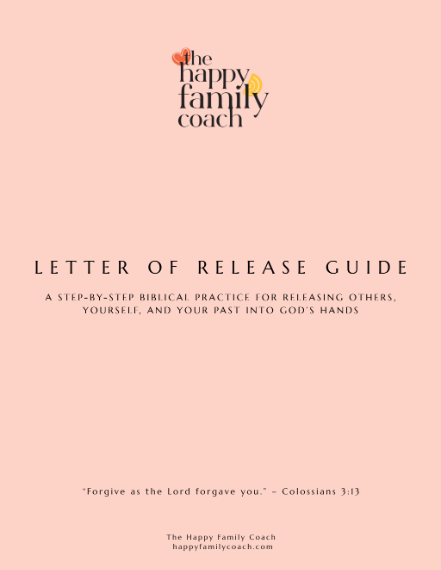Danielle Alvarez Greer
it's me,
I’m a family coach and biblical counselor with 14+ years of experience helping families heal, connect, and thrive. My approach integrates faith-based principles with practical tools to foster emotional well-being, healthy communication, and lasting transformation in families and individuals.
Listen
to the podcast!
Tune in to The Happy Family Coach Podcast for practical and faith-based insights on strengthening families, relationships, and personal growth
Take
THE TOOLKIT COURSE
The Happy Kid Toolkit course offers practical, faith-centered tools to help families break free from unhealthy patterns and create healthier relationships. Take the first step towards transforming your family dynamics today.
Schedule
YOUR SESSION
Ready to make lasting changes? Whether it's marriage, family, or personal growth, I offer biblical counseling and family coaching to help you break free from old patterns and embrace healing. Start your healing journey today.
wanna know more >
Listen here >
Start the Course Now >
Book Your Session Now >
💔 Healing from Betrayal & Broken Trust

October 17, 2025
What Forgiveness Really Looks Like in Relationships
Betrayal cuts deeper than almost any wound. It shakes our sense of safety, distorts our trust, and can leave us wondering if we’ll ever let anyone close again.
I’ve been there too — that gut-punch moment when someone you trusted breaks the very bond that once felt sacred. I remember sitting in the quiet after a painful conversation, feeling the ache pulse through my chest. Betrayal doesn’t just bruise our hearts; it rewrites the stories we tell ourselves about love, loyalty, and safety.
But here’s what I’ve learned: God never wastes pain.
He doesn’t just patch up broken hearts; He rebuilds them stronger, wiser, and more rooted in Him.
1. Forgiveness Isn’t Forgetting — It’s Freedom
We often think forgiveness means pretending the betrayal never happened. But true forgiveness isn’t denial; it’s release.
It’s saying:
“I’m stepping off the judgment seat. God, You’re the Judge — and I’m handing them, and myself, back to You.”
Unforgiveness is like drinking poison and waiting for the other person to get sick. It corrodes us from the inside out.
Forgiveness, though, clears the toxins of resentment and opens the door to peace.
That doesn’t mean reconciliation is automatic. Sometimes forgiveness happens long before reconciliation is even possible — or safe.
2. Boundaries Are Holy
Forgiveness is unconditional. Trust is not.
You can forgive someone and still say, “I need to see fruit of repentance before I let you close again.”
Boundaries aren’t punishment; they’re protection. They make room for genuine restoration when the other person is ready — and keep you safe if they’re not.
Think of Jesus and Peter.
Peter denied Him three times, and Jesus didn’t pretend it never happened.
He asked Peter three times, “Do you love Me?” and restored him gently — giving Peter the chance to produce fruit.
That’s what healthy trust rebuilding looks like: grace paired with truth.
⚠️ When “Forgiveness” Gets Twisted
Sometimes betrayal doesn’t come from outsiders — it comes from people who say they love Jesus.
They quote Scripture out of context, guilt you into silence, and call your boundaries “unforgiving.”
They weaponize the Word to protect their own image instead of pursuing truth.
I’ve lived this. I’ve had people twist God’s Word to make me feel like setting boundaries was sinful — that holding them accountable meant I was “not walking in love.”
I’ve been accused of being “divisive” for simply trying to address a pattern of behavior biblically.
But let me be clear: boundaries are not rebellion. They are wisdom.
Boundaries are how we love truthfully and safely. Jesus Himself modeled them.
Example 1: The Manipulative Twist
Them: “You’re supposed to forgive me and move on. The Bible says love keeps no record of wrongs.”
Your Healthy Response: “I do forgive you. But love also rejoices in truth. Trust takes time to rebuild, and forgiveness doesn’t mean pretending it didn’t happen.”
👉 Forgiveness clears the debt; boundaries protect your heart while healing happens.
Example 2: The Guilt-Laden Plea
Them: “I thought Christians were supposed to show grace. You’re being cold and unkind by not letting me back in.”
Your Healthy Response: “Grace isn’t the absence of consequences. God’s grace also leads us to repentance. I’m choosing to forgive, but rebuilding relationship will require honesty, humility, and time.”
👉 Grace without truth isn’t grace — it’s enablement.
Example 3: The Spiritual Manipulation
Them: “You’re not following Matthew 18 — you’re gossiping by talking to others about this.”
Your Healthy Response: “Actually, Matthew 18 calls us to seek reconciliation in truth and humility. When someone refuses correction or repentance, bringing others in is the next biblical step. Accountability isn’t gossip.”
👉 When Scripture is used to silence you instead of lead you to truth, it’s being misused.
Example 4: The False Humility Trap
Them: “I’m sorry you felt that way. I didn’t mean it like that — you’re just being sensitive.”
Your Healthy Response: “I appreciate your words, but that’s not an apology. True repentance takes responsibility and shows change. I’m open to rebuilding when that happens.”
👉 Healthy forgiveness requires truth. Anything less is emotional manipulation dressed up as repentance.
Here’s the truth:
Jesus didn’t submit to spiritual abuse. He confronted it.
He walked away from manipulation, corrected distorted Scripture, and refused to let false guilt dictate His obedience.
He never confused compassion with compliance.
If someone uses “forgiveness” to pressure you into silence, you’re not disobedient — you’re discerning.
The same Jesus who stood up to religious hypocrisy stands with you now, calling you into truth, freedom, and peace.
3. Healing the Lies Betrayal Plants
Betrayal whispers lies that take root deep inside:
“I’m not worthy.”
“Everyone leaves.”
“I’ll never trust again.”
But the cross silences those lies.
God’s truth declares:
“You are chosen, never forsaken, and held securely in Me.”
The healing journey is really a core belief transformation.
As Romans 12:2 says, “Be transformed by the renewing of your mind.”
We heal when we let the Holy Spirit rewrite the story we tell ourselves.
4. From the Unhappy Kid Triangle to the Happy Kid Triangle
When betrayal hits, we often fall into one of the Unhappy Kid Triangle roles:
- Helpless Baby: “I’ll never be safe again.”
- Blaming Bully: “I’ll make them pay.”
- Bossy Helper: “I’ll control harder so I can’t be hurt.”
But healing happens when we step onto the Happy Kid Triangle:
- Taking responsibility for our emotions.
- Renewing our minds with God’s truth.
- Choosing love and boundaries over fear and control.
That’s where freedom lives.
5. My Personal Journey
I’ve experienced betrayal in friendship and in ministry — the kind that makes you question everything.
But I’ve also seen how God met me in that valley.
He didn’t rush me. He sat with me.
He taught me that forgiveness isn’t about pretending it didn’t hurt — it’s about letting Him carry what I was never meant to.
There’s a peace that comes when you finally stop trying to control the outcome and trust the Healer instead.
6. Your Next Step Toward Freedom
Maybe betrayal still echoes in your heart today. Maybe you’ve forgiven with your mouth but not yet with your heart.
Start here:
- Write their name on a piece of paper.
- Whisper a prayer of release: “Lord, I hand them over to You. I choose freedom today.”
- Then ask God what healthy boundaries look like for this season.
If you need help with that process, download my free Letter of Release Guide — it walks you through prayerfully releasing someone to God while protecting your heart.

Free Resource: Letter of Release
Need help processing pain, grief, or heartbreak?
Download my FREE Letter of Release resource — a journaling guide that helps you release what you’re carrying to the Lord and walk forward in freedom.
Final Encouragement
Jesus knows the sting of betrayal — and yet He forgave, loved, and walked free.
You can too.
Forgiveness doesn’t erase the past, but it does free your future.
If this message stirred something in your heart, I’d love for you to keep walking with me. In Episode 79 of The Happy Family Coach Podcast, I dive even deeper into what forgiveness looks like when trust has been broken — and how to rebuild with grace and truth.
Listen below:
Episode 79 – Healing from Betrayal & Broken Trust: What Forgiveness Looks Like in Relationships
It’s the perfect companion to this post and will give you even more encouragement and biblical insight as you begin healing from betrayal and learning to walk in freedom again.
With hope and gratitude,
